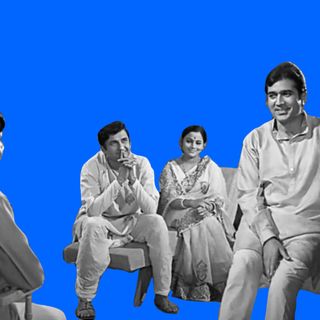
In the Digital Era, Dating to Increase Your Social Capital Has a Name: ‘Throning’
Throning prioritizes influence and clout over shared interests and values, meaningful connection, and emotional intimacy.

Throning is a relatively novel term in the dating universe. As a phenomenon, however, it isn’t so new — even if one hasn’t heard the term before, they’re likely to be familiar with what it entails. Most of us have heard of — or, perhaps, even been directly acquainted with — people who use dating to garner social capital. Controversial as throning might sound, it’s a phenomenon that has existed for generations.
With humans being social creatures, by definition, most relationships we form outside of our families — through romantic and sexual relationships, work connections, and even friendships — can give us access to the circles of the people we’re bonding with. And, per se, there’s absolutely nothing wrong with one expanding their social circles thus. But the problem arises when one’s motivation to date another is driven solely by their social aspirations, rather than romantic interest, attraction, affection, and most other things that form the foundation of a relationship. In essence, then, throning prioritizes influence and clout over shared interests and values, meaningful connection, and emotional intimacy.
A 2018 survey of 1,000 single users of an online dating app had 9% of the responders admitting to having used dating as a means to elevate themselves socially. Meanwhile, 27% reported believing that they had been used as a rung on the social ladder by their former partners. Evidently, dating someone solely for their social status and influence is beginning to become rather mainstream in the digital age. “Inspired by celeb couples like Kim Kardashian and Kanye West, throning is another word for dating someone who boosts your reputation — and, probably, ego — just by association,” notes a lifestyle magazine.
It is, perhaps, the rise of social media that has incited the growing prominence of throning. Platforms like Instagram allow people regular check-ins into the lavish lifestyles of the rich and famous — making the pursuit of wealth and status seem more desirable, and even attainable, than ever before. In a culture that has conditioned us to equate success and status with happiness and fulfillment, the trend of throning was bound to flourish.
Take a 2019 article in The Atlantic which argues that now, more than ever before, clout is what many on the internet are aspiring for. In this moment of time, internet clout is valuable social currency, making the pursuit of social capital different today than it used to be. It’s no longer just about wealth or connections, it’s also about optics and social capital by way of personality.
Related on The Swaddle:
Why Ghosting Is Not Always a Form of ‘Emotional Abuse’
But what does clout mean today? “When my college-age sisters talk about their friends accruing dozens of Snapchat streaks ‘for clout,’ they’re joking, but they’re not joking — the words come out in the same intonation as when they remark that someone dyes their hair — as if to say people simply do things for clout. They simply buy food with money. They simply breathe,” Kaitlyn Tiffany writes in The Atlantic piece. “The meaning of clout is porous, but the word is everywhere. As of this writing, 1.8 million Instagram posts have been tagged #clout. On TikTok, videos tagged #clout have been viewed 1.5 billion times. A whole category of self-help books is dedicated to acquiring and wielding clout.” In a sense, then, with online clout becoming social currency, the pursuit of fame in the virtual world is beginning to replace the quest for wealth. Both, after all, are means to wield power; it’s just that, courtesy of social media, fame has become the more aspirational path to power.
Indeed, the pursuit of clout, then, is what sustains the phenomenon of throning. But its biggest enabler in the present day and age, perhaps, is the advent of dating apps. Granted, in India, certain classist and casteist biases that remain deeply ingrained in our outlooks, hinder us from straying too far; they don’t, however, obstruct one’s path to gaining social capital within the limits their prejudices permit.
By and large, online dating turns us into commodities in a sexual marketplace, where some people — by virtue of optics that stretch beyond the way they look — have a higher “value.” Dating them sort of assumes a flex equivalent to owning high-fashion items. It’s a hierarchy people might find themselves aspiring to — often, subconsciously so. A study in Science Advances had found that most people on dating apps are trying to date people 25% more desirable than themselves — almost approaching dating like investing in a portfolio.
“[B]eing in a relationship with a public figure because they are famous will boost your reputation. To them, you actually don’t matter. What matters is your fame. This is in a way similar to gold-digging, which is for money, and throning, which is for social status,” states an article.
Unlike gold-digging, however, throning isn’t typically bursting with misogyny. “[T]he word ‘gold digger’ is irrevocably gendered. It really only ever refers to women, and when it does refer to men, people preface it with the word ‘male,’ because the word on its own is assumed to describe a female,” notes an article by The Swaddle, which goes on to cite the example of activist, model, author, and philanthropist, Padma Lakshmi. “Think about it: If Padma was, instead, a man with several TV shows and books under his belt, would he be called a gold digger for only dating successful women? Maybe, but probably not as ubiquitously.”
Related on The Swaddle:
Why It Can Be Harder to Get Over Almost‑Relationships Than Actual Ones
Is ‘throning’ the gender-neutral answer to keeping ‘gold-digger’ as a concept, but without the sexism? Maybe. In general, throning can refer to people — irrespective of their gender — forging romantic ties to further their social-climbing objectives. It doesn’t come with any baggage and describes social climbers across the board, without singling anyone out for behavior that isn’t actually social-climbing.
As we know, though, the phenomenon of using someone’s romantic interest in us as a stepping stone to social elevation, under the garb of reciprocating their feelings, isn’t a new phenomenon. Is there any point, then, in deliberating it so much that we’ve ended up christening it? British author Lucy Mangan says yes. “I’m always uplifted by the advent of new dating vocabulary… [Besides] generally captur[ing] the less appealing aspects of human nature and behavior… [i]t gives you greater ownership of the experience and more power over it; specifically, the power to recognise it as the work of a certain type of shit, retrofit the warning signs and avoid them in the future,” Mangan writes. “[N]ew words make us look anew at old behaviours and help us avoid unconsciously accepting them as normal practice.”
Having said that, in an era where the largely unaffordable lifestyles of celebrities are normalized day in and day out while the wealth gap between the ultra-rich and just about everyone else probably continues to expand faster than one can type t-h-r-o-n-i-n-g, the allure of dating someone famous or influential may be tempting; after all, we have, to a certain extent, normalized the pursuance of social clout. But it can also lead to shallow and unfulfilling relationships — often, for both parties involved.
In addition to breeding emotional dissatisfaction among the throners and thronees, individually, the rise of phenomenon also spells adverse implications for society, at large — perpetuating the idea that wealth and status, rather than kindness, empathy, and emotional chemistry, are the most important qualities in a potential partner. Not only that, but it also reinforces existing power structures, allowing those at the pinnacle of the socio-economic ladder to attract partners based entirely on their status, rather than who they are as people. If it sounds a hell of a lot like the upper caste arranged marriages spotlighted by Netflix, that’s because it is. Much like arranged marriages, throning, too, serves as a means to secure one’s socio-economic status, using romantic relationships as a means to achieve material gains.
And so, given that throning subscribes to precisely the kind of thinking that has fostered the practice of prioritizing religion, caste, height, annual income, skin color, and social capital — above one’s personality, character, and value system, which are, arguably, all traits that are relevant for a life-long partnership — in arranged marriages, not normalizing the phenomenon is, perhaps, in our best interest.
Devrupa Rakshit is an Associate Editor at The Swaddle. She is a lawyer by education, a poet by accident, a painter by shaukh, and autistic by birth. You can find her on Instagram @devruparakshit.
Related


How ‘Succession’ Ended the Girlboss
